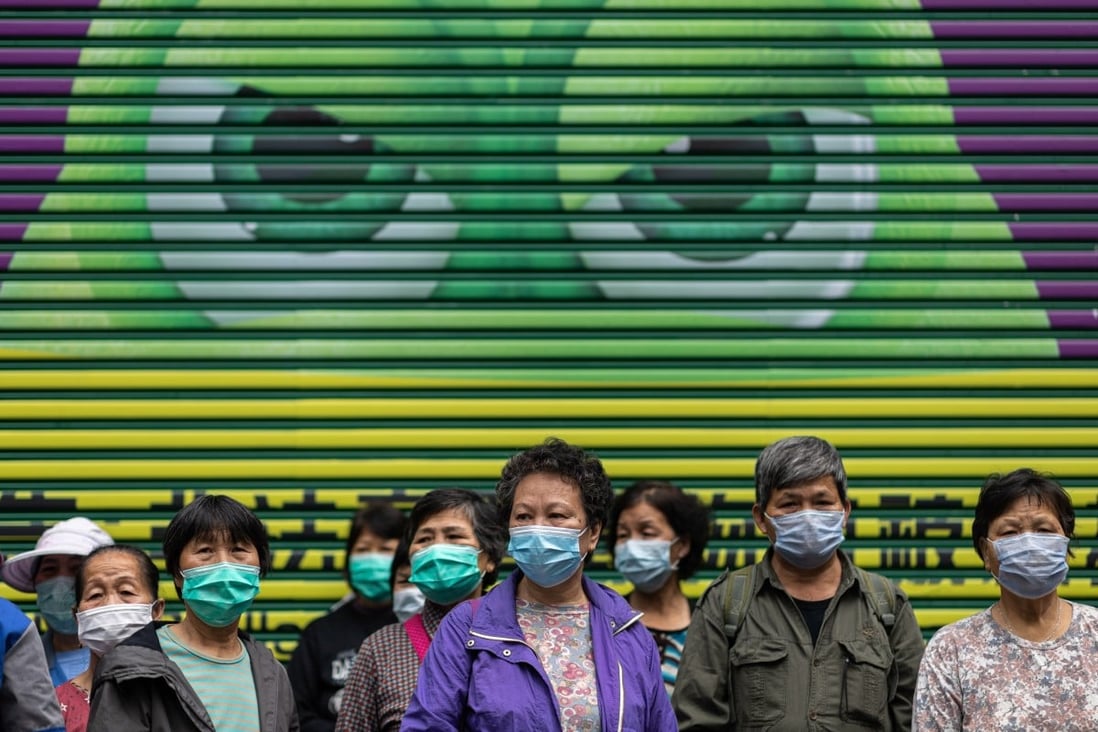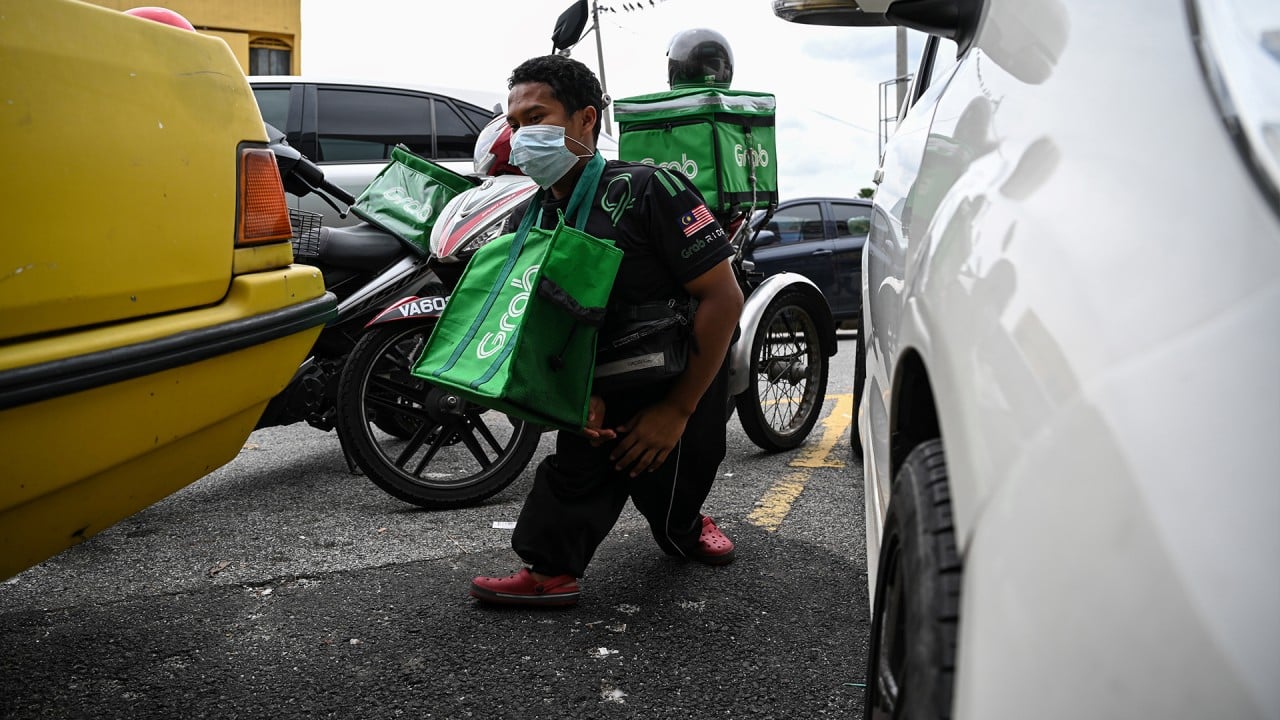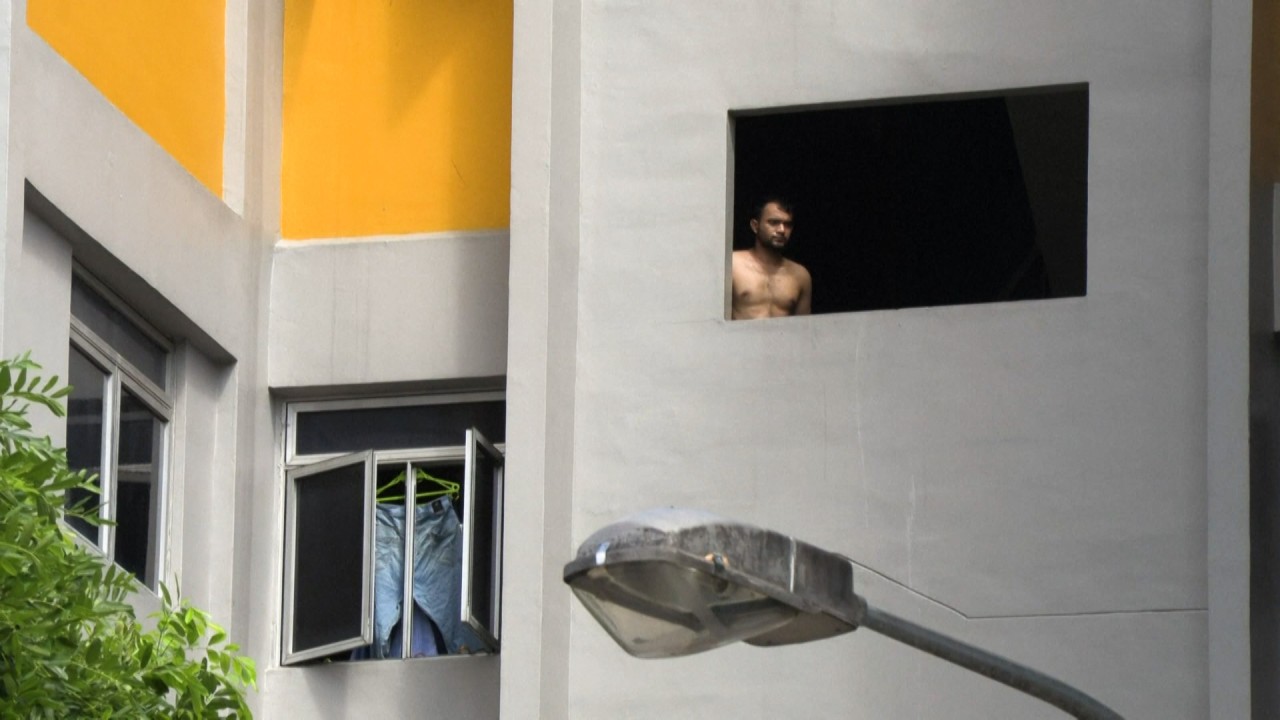While Covid-19 pandemic has made clear the importance of essential workers, showing appreciation should translate into better pay and working conditions
Yew Chiew Ping
Published: 27 Dec, 2020

Street cleaners wait in line to receive free face masks in Hong Kong on February 14. Photo: EPA-EFE
Growing up in Singapore and perhaps other Asian societies, you would have heard your elders warn, “If you don’t study hard, you’ll grow up to be a road sweeper/garbage collector/labourer.”
In these societies, blue-collar jobs have traditionally been seen as undesirable and even a sign of failure in life. While we may be embarrassed to voice such thoughts aloud today, the bias against blue-collar jobs persists.
The Covid-19 pandemic has made clear the importance of essential workers. Grocery clerks had to work harder to replenish supplies after bouts of panic buying, security personnel are doubling up as temperature screeners, and cleaners have to disinfect public facilities more frequently. During lockdown, our creature comforts depended on delivery workers who brought everything we need to our doorstep.
Thanks to these essential workers – whose modest earnings are grossly incommensurate with their contributions to society – the rest of us can carry on with our everyday life with little deprivation in these challenging times.

VIDEO 02:05
Disabled food delivery rider on front line of Malaysia’s fight against Covid-19 pandemic
But how have essential workers fared in this pandemic?
Covid-19 has thrown inequality into sharp relief. The risk of contracting the virus is uneven across society and so is its impact. And it is exactly these blue-collar and essential workers who are the most vulnerable.
Unlike professionals, managers, executives and technicians (PMETs), most essential workers cannot work from home because their job requires their physical presence at the workplace. Yet they may not even be equipped with adequate protective gear.
At the onset of the pandemic when face masks were in short supply, many cleaners were not provided with sufficient masks. Some could not even afford to buy disposable masks. This was the case in Hong Kong at the beginning of the year when a box of 50 surgical masks cost HK$200 (US$26), forcing the socially disadvantaged to resort to washing and reusing their face masks.
Quitting is not an option for many essential workers despite the job hazards and low pay. The salary of general cleaners in Singapore can be as little as HK$6,970 excluding allowances, in Hong Kong, cleaners are paid around HK$10,200 including allowances.
Hong Kong charity distributes hygiene kits to street cleaners to fight coronavirus
Social distancing is also tricky when you are poor and confined to small spaces. In Hong Kong, the July and August wave of Covid-19 was more severe in low socioeconomic districts and public housing estates, including Tsz Wan Shan in Wong Tai Sin district that has the highest poverty rate. In Singapore, migrant workers’ dormitories with poor living conditions became hotbeds of Covid-19 transmission.
Blue-collar workers also suffered sharper pay cuts and greater job cutbacks. In Singapore, lower-income earners with a monthly salary of under HK$17,435 were more likely to have suffered a pay cut of 10 per cent to over 50 per cent. Non-PMETs also faced a higher rate of job loss in the second quarter of 2020.
Similar trends have been observed in Hong Kong, where the unemployment rate of blue-collar and service workers from August to October was generally higher than that of PMETs.

VIDEO 01:53 Singapore migrant workers under quarantine as coronavirus hits dormitories
If the pandemic has laid bare to us the essentials for a decent life – food security, a clean and safe environment, adequate personal space – then we ought to reflect on how society has fallen short of ensuring that all have access to these essentials. We should accord greater value and respect to the members of society who enable us to live decently, because leading our own life with dignity should not be predicated on others living theirs with less dignity.
This means that we must seriously reconsider our approach towards poverty and inequality. The Singapore government has pledged to improve the living conditions of migrant workers. However, the proposal for a universal minimum wage of HK$7,538 was dismissed in Singapore’s parliament in October. In September, in Hong Kong, business leaders
rejected the call to increase the hourly minimum wage from HK$37.50 to HK$39.
Such resistance to very modest increases in the income of the lowest-paid workers is incongruous with society’s growing appreciation of workers – against the backdrop of Covid-19, eight in 10 Singaporeans have expressed a willingness to pay workers more for essential services.
The pandemic has shown us the importance of what we used to take for granted. As we transition to a post-pandemic world, we could either waste this opportunity for meaningful change, or seize the chance to forge a “new normal” that is more inclusive and compassionate, and less unequal.
Dr Yew Chiew Ping is head of Contemporary China Studies at the Singapore University of Social Sciences
Quitting is not an option for many essential workers despite the job hazards and low pay. The salary of general cleaners in Singapore can be as little as HK$6,970 excluding allowances, in Hong Kong, cleaners are paid around HK$10,200 including allowances.
Hong Kong charity distributes hygiene kits to street cleaners to fight coronavirus
Social distancing is also tricky when you are poor and confined to small spaces. In Hong Kong, the July and August wave of Covid-19 was more severe in low socioeconomic districts and public housing estates, including Tsz Wan Shan in Wong Tai Sin district that has the highest poverty rate. In Singapore, migrant workers’ dormitories with poor living conditions became hotbeds of Covid-19 transmission.
Blue-collar workers also suffered sharper pay cuts and greater job cutbacks. In Singapore, lower-income earners with a monthly salary of under HK$17,435 were more likely to have suffered a pay cut of 10 per cent to over 50 per cent. Non-PMETs also faced a higher rate of job loss in the second quarter of 2020.
Similar trends have been observed in Hong Kong, where the unemployment rate of blue-collar and service workers from August to October was generally higher than that of PMETs.

VIDEO 01:53 Singapore migrant workers under quarantine as coronavirus hits dormitories
If the pandemic has laid bare to us the essentials for a decent life – food security, a clean and safe environment, adequate personal space – then we ought to reflect on how society has fallen short of ensuring that all have access to these essentials. We should accord greater value and respect to the members of society who enable us to live decently, because leading our own life with dignity should not be predicated on others living theirs with less dignity.
This means that we must seriously reconsider our approach towards poverty and inequality. The Singapore government has pledged to improve the living conditions of migrant workers. However, the proposal for a universal minimum wage of HK$7,538 was dismissed in Singapore’s parliament in October. In September, in Hong Kong, business leaders
rejected the call to increase the hourly minimum wage from HK$37.50 to HK$39.
Such resistance to very modest increases in the income of the lowest-paid workers is incongruous with society’s growing appreciation of workers – against the backdrop of Covid-19, eight in 10 Singaporeans have expressed a willingness to pay workers more for essential services.
The pandemic has shown us the importance of what we used to take for granted. As we transition to a post-pandemic world, we could either waste this opportunity for meaningful change, or seize the chance to forge a “new normal” that is more inclusive and compassionate, and less unequal.
Dr Yew Chiew Ping is head of Contemporary China Studies at the Singapore University of Social Sciences
No comments:
Post a Comment